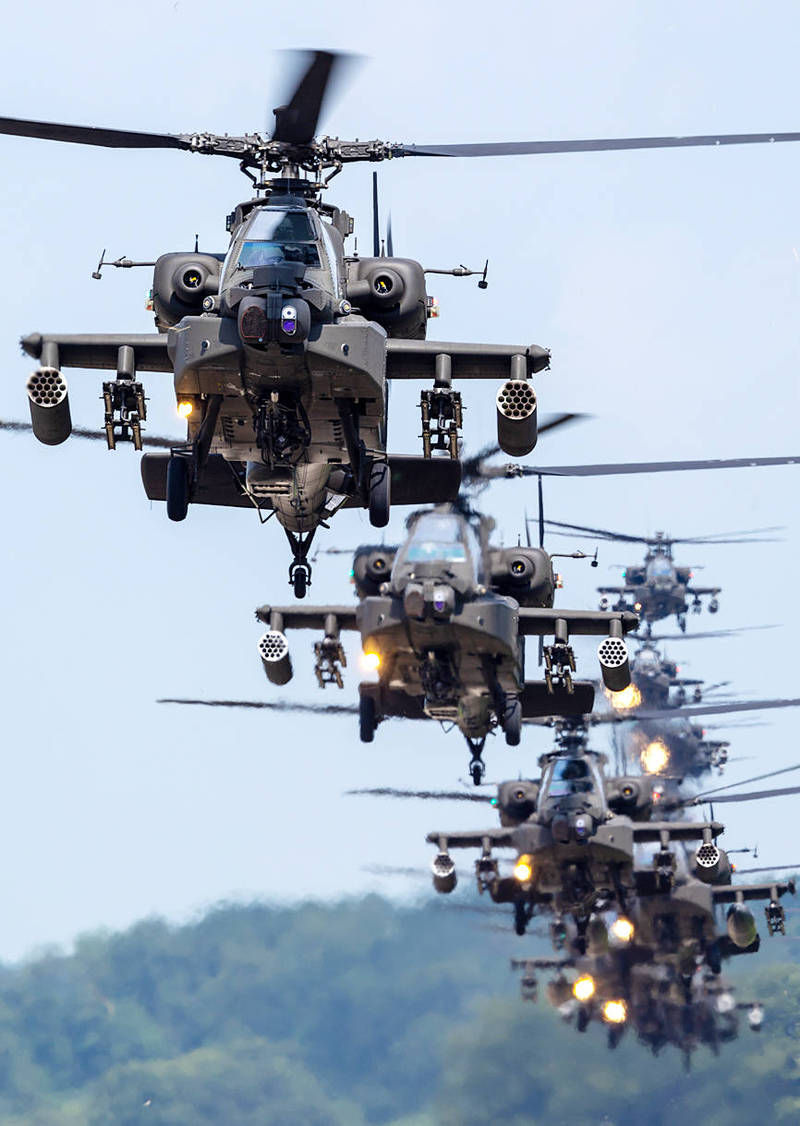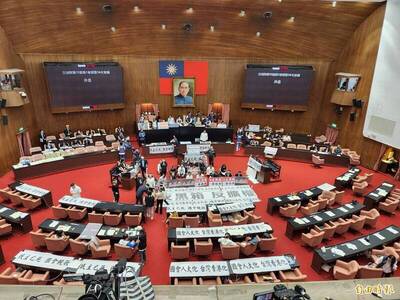《TAIPEI TIMES》 Apache, Black Hawk ammunition part of US deal

South Korean Army Apache attack helicopters take off during a large-scale drill in Icheon, South Korea, on July 25. Taiwan and the US have signed a six-year contract for ammunition and parts for Apache and Black Hawk helicopters. Photo: EPA-EFE
FIGHTING SHAPE: The contract intends to ensure that Taiwan is able to fight if surrounded, as Taipei and Washington work toward further air force and navy deals
By Lo Tien-pin and Jonathan Chin / Staff reporter, with staff writer and Reuters
Taiwan and the US have inked a six-year, NT$1.36 billion (US$45.01 million) contract for ammunition and parts for Apache and Black Hawk helicopters, the Ministry of National Defense said in a notice.
The army and the American Institute in Taiwan signed the deal for weapons, ammunition and parts to be implemented from last month to December 2028, according to the contract notice published on Friday last week.
The contract came amid Western media reports that China’s military drills in waters around Taiwan spurred US President Joe Biden to increase military aid to the nation.
The agreement was part of a US-driven effort to address fears that Taiwanese defenses could be crippled by a Chinese blockade on military materiel, energy and other resources, a defense official told the Chinese-language Liberty Times (sister paper of the Taipei Times) on condition of anonymity.
The contract is meant to ensure that the army’s helicopters would have enough ammunition and spare components to fight if the country were to be surrounded, the source said.
Taipei and Washington are working toward similar deals for other weapons platforms to augment services across all sectors of the armed forces, the person said.
These deals would furnish parts and ammunition for the army’s armored, artillery and missile forces, along with the navy’s principal surface combatants, and the air force’s warplanes and defense units, the source said.
Separately, the defense ministry asked the public to support an increase in military spending included in next year’s proposed general budget, saying that it needs the funds to obtain warships and aircraft, and develop asymmetric warfare capabilities while covering personnel costs.
China’s military drills have put Washington on edge, but not enough to spur an immediate increase in weapons sales to Taiwan, Reuters reported.
The White House and US lawmakers have said that some legislative items favorable to Taiwan could be announced in the coming weeks or months.
However, the focus at present is on sustaining Taiwan’s military and fulfilling existing orders, rather than offering new capabilities that would likely intensify tensions with China, three sources said on the condition of anonymity.
“I think there will be an attempt to push stuff to Taiwan, and not just weapons. Supplies, should there — God forbid — be an embargo. More munitions. Lower-level stuff,” one source familiar with US arms sales said.
Such approvals could be announced as soon as next month, the sources said, adding that they would demonstrate that Beijing’s blockade-style drills following US House of Representatives Speaker Nancy Pelosi’s visit earlier this month have not shaken US support.
Critics of the administration’s approach have said those drills should be a wake-up call to encourage Washington to do more for Taiwan.
A blockade would challenge one of the core tenets of the US’ Taiwan Relations Act, which defines such action as a threat to security in the western Pacific.
Defense sales would be designed to meet “the evolving security circumstances that Taiwan faces,” US National Security Council Indo-Pacific Coordinator Kurt Campbell said.
Invasion and blockade scenarios “are indeed taken into our calculus, and you will see that going forward,” he said.
Washington has since 2017 approved more than US$18 billion in arms sales to Taiwan, but new approvals have slowed since Biden’s election in 2020, amid delivery backlogs and reports of disagreement between Washington and Taipei over what Taiwan needs.
Representative to the US Hsiao Bi-khim (蕭美琴) last week said that following China’s drills, there was still a “practice of continuing arms sales.”
“I think what we are trying to do is ensure that these are regularized, normalized processes,” Hsiao said.
“In earlier years they would put big packages together, wait a few years to make a big announcement. That’s no longer the practice. Our requests are reviewed on a case-by-case basis, and we will proceed as such,” she said.
Bonnie Glaser, a Taiwan expert at the German Marshall Fund of the US, said that Taiwan’s priority appears to be securing deliveries of a substantial backlog of prior arms sales requests.
Those include hundreds of shoulder-fired Stinger anti-aircraft missiles and Harpoon anti-ship missile launchers, the latter deal set for a December 2028 completion, Pentagon contracting data showed.
Taiwan signaled in May that it had abandoned a plan to buy advanced new multi-mission helicopters from the US, saying they were too expensive, although local media reported that Washington rejected the sale.
The US was never keen to sell the MH-60R helicopters to Taiwan, assuming they would be quickly destroyed in a conflict with China, people familiar with the matter said.
新聞來源:TAIPEI TIMES



















